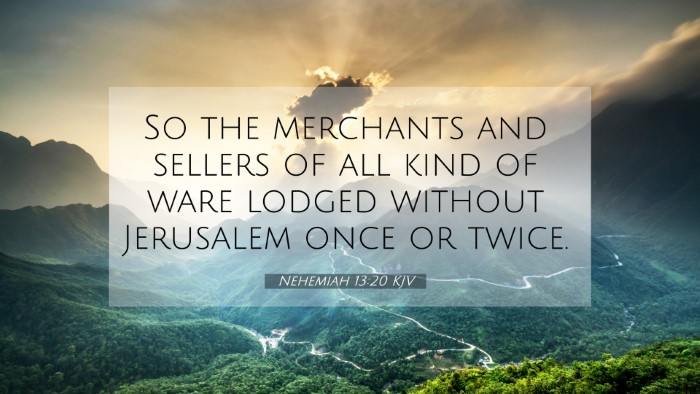Understanding Nehemiah 13:20
Nehemiah 13:20 states:
"So the merchants and sellers of all kinds of wares lodged outside Jerusalem once or twice." (Nehemiah 13:20, ESV)
Verse Meaning
This verse occurs in a section where Nehemiah is reforming practices in Jerusalem after returning from his time in Persia. The merchants and sellers represent the activities that Nehemiah sought to curtail, particularly during the Sabbath.
Contextual Summary
Nehemiah had imposed strict regulations to maintain the sanctity of the Sabbath, a key aspect of Jewish law. This verse highlights the persistent challenge Nehemiah faced—merchants continuing to infringe upon the Sabbath day even after clear directives had been issued. It shows both the defiance of the merchants and Nehemiah's dedication to reestablishing divine order within the community.
Commentary Insights
- Matthew Henry: Nehemiah emphasizes the importance of the Sabbath and how business activities distract from worship and community rest. He points out that the merchants may have encamped outside the city gates, seeking opportunities to lure the people into buying and selling goods contrary to God’s commandments.
- Albert Barnes: Barnes elaborates on the significance of this verse in the broader context of Israel's covenant with God. He indicates that allowing commerce on the Sabbath undermines the holiness commanded by God, reflecting a disregard for spiritual principles in favor of economic gain.
- Adam Clarke: Clarke draws attention to the systematic approach Nehemiah took to enforce the Sabbath prohibition. He remarks on how the persistence of the merchants outside the city indicates a deeper issue of cultural integration versus adherence to divine commandments.
Cross-References
This verse connects to several other Biblical passages. Here are some relevant references:
- Exodus 20:8-11: The commandment to remember the Sabbath day and keep it holy.
- Nehemiah 10:31: A prior commitment to refrain from buying on the Sabbath.
- Jeremiah 17:21-22: Encouragement to keep the Sabbath and refrain from carrying burdens.
- Isaiah 58:13-14: The blessing of honoring the Sabbath.
- Mark 2:27: Jesus' teaching that the Sabbath was made for man, not man for the Sabbath.
- Acts 15:20: Early church directives to abstain from practices contrary to God’s commands.
- Hebrews 4:9-10: References to rest for God’s people.
Thematic Connections
Nehemiah 13:20 presents a clear theme of obedience to God’s covenant and the importance of sacred time. This theme resonates across various Scriptures:
- Obedience vs. commerce: The continuous struggle between worldly affairs and spiritual commitments is a recurring theme, seen in passages such as Matthew 6:24, which speaks to serving God vs. riches.
- Utilization of rest: How the Sabbath is regarded is further examined through biblical texts like Luke 6:1-5, where Jesus addresses misunderstanding about Sabbath activities.
Applications for Modern Readers
Modern applications of Nehemiah 13:20 draw parallels to contemporary issues of prioritizing spiritual practices over commercial interests, underscoring the necessity of balance in life. The struggles Nehemiah faced resonate with today's readers, encouraging reflections on how one manages work and worship.
SEO Utility
The discussion around Nehemiah 13:20 presents numerous thematic Bible verse connections. For those studying the connections between Bible verses, this verse serves as an essential reference point for examining the impact of commerce on spirituality. This insight is crucial for anyone engaged in cross-referencing Biblical texts, whether for personal study, sermon preparation, or academic pursuits.
Conclusion
In sum, Nehemiah 13:20 offers rich insights into the challenge of upholding spiritual commitments amidst societal pressures. By leveraging tools for Bible cross-referencing, readers can deepen their understanding of how this verse aligns with broader Biblical themes, enhancing both personal growth and community awareness.


